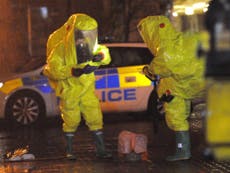Russian spy 'poisoning': Police officers swarm near Zizzi's restaurant at centre of Sergei Skripal case
Woman taken to hospital but police did not immediately confirm link to poisoning
Emergency services have descended on an office building next to the Zizzi restaurant at the centre of investigations over the poisoning of a Russian spy.
Police, paramedics and firefighters surrounded Sarum House shortly after 1pm, blocking the road.
At least one woman was seen being walked to an ambulance by paramedics and driven away.
Unconfirmed local reports suggested she may have suffered a panic attack but officials did not immediately confirm the reason for the call.
A spokesperson for the Metropolitan Police said she could not say whether the incident was linked to the poisoning of Sergei Skripal and his daughter, Yulia.
They remain in intensive care in Salisbury District Hospital after being found unconscious on a bench in the city centre on Sunday.
The pair had no visible injuries and had been exposed to an "unknown substance", which has not yet been publicly named by authorities.
Amber Rudd said investigators "know more" about the chemical following a meeting of the Government's emergency Cobra meeting this morning.
The Home Secretary would not comment on speculation that Mr Skripal and his daughter were targeted by Russia, adding: “We've taken all the action necessary to ensure the public are safe and I'd like to reassure them.”
Police have cordoned off a new area linked to the case at a business park in Amesbury, around a 20-minute drive from where they were found collapsed on a bench in Salisbury.
Investigators are still working inside a Zizzi restaurant and The Mill pub nearby, where the pair are believed to have eaten and drank before falling ill.
The Russian foreign ministry said allegations were being used to “whip up an anti-Russian campaign” in Britain, amid comparisons to the assassination of former Russian spy Alexander Litvinenko.
He was poisoned using radioactive polonium put in a cup of tea in 2006, but experts told The Independent that symptoms for Mr Skripal and his daughter match those caused by toxins including ricin, sarin and the synthetic opiod fentanyl.
Suspicion has turned to the Russian government, which jailed Mr Skripal for “treason” in 2006, or former spies he betrayed while working for MI6 during his time a colonel in the GRU military intelligence service.
He was given refuge in Britain after being exchanged in 2010 for Russian agents caught in the West as part of a Cold War-style swap in Vienna.
Boris Johnson, the Foreign Secretary, told MPs that although no culprit has yet been found, if suspicions of Russian state involvement are proven, “this Government will take whatever measures we deem necessary to protect the lives of people in this country, our values and our freedoms”.
Branding Vladimir Putin’s government a “malign and disruptive force”, Mr Johnson said harsher international sanctions could be imposed if it is found to have had a hand in the attack on Mr Skripal.
The Russian Embassy characterised the reaction as “a new phase of the anti-Russian campaign” in Britain and denied involvement by the Kremlin’s security services.
Subscribe to Independent Premium to bookmark this article
Want to bookmark your favourite articles and stories to read or reference later? Start your Independent Premium subscription today.





Join our commenting forum
Join thought-provoking conversations, follow other Independent readers and see their replies
Comments